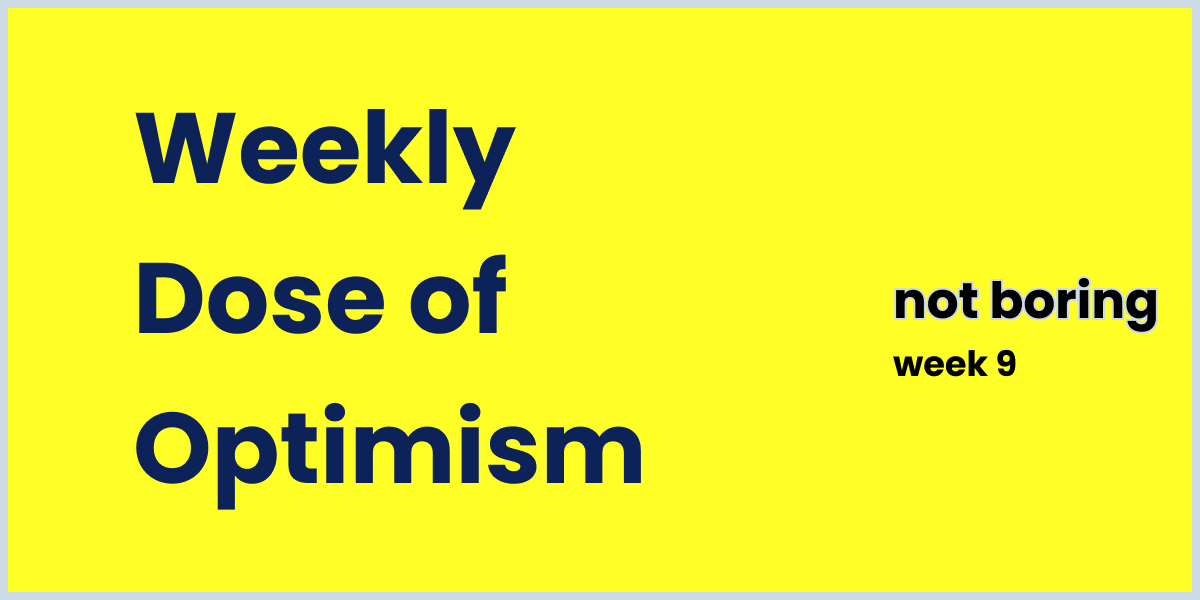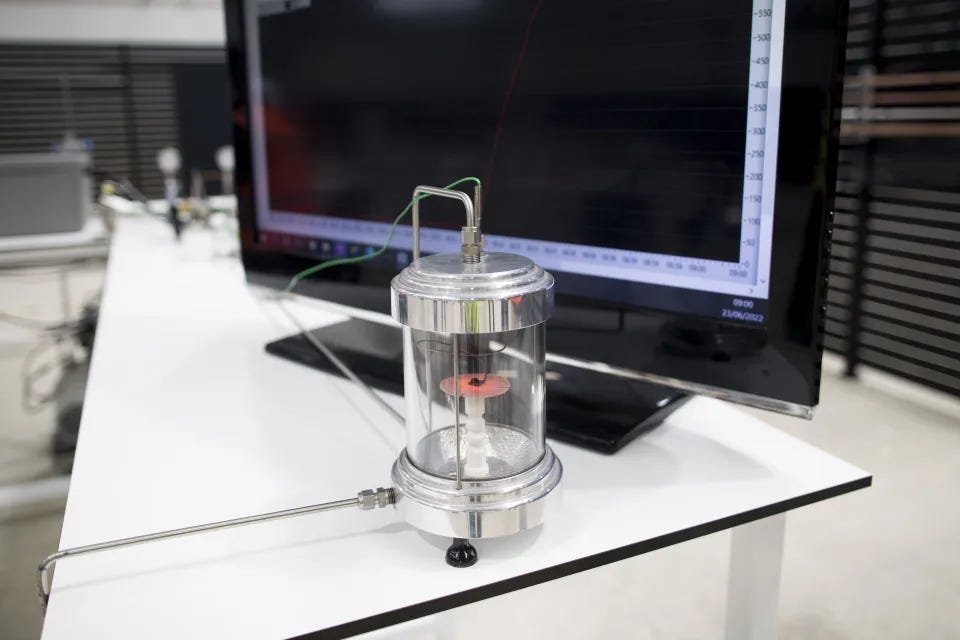Weekly Dose of Optimism #9
Fermi's Responsibility, Chinese Research, Forever Chemicals, Heated Hydrogen, and the Golden Age of AI
Come for the Optimism, stay for the in-depth analyses of tech companies and trends:
Hi friends 👋,
Happy Friday! Welcome to our 9th Weekly Dose of Optimism. I hope you’re on a beach somewhere, one eye shut squinting against the glare on your phone to read about all of the incredible things your fellow humans pulled off this week.
This Weekly Dose of Optimism is brought to you by… MarketerHire
Let’s say you’re feeling optimistic enough about your business that you want to invest in growth, but you don’t want to lock yourself into a long hiring process and full-time hires given the uncertain market conditions. MarketerHire is for you.
With MarketerHire, you can find and hire pre-vetted expert marketers in less than 48 hours. Staying lean has never been more important — with MarketerHire, you can easily scale your marketing team up or down depending on the needs of your business. There are no long-term contracts and the first 5 hours of any engagement are risk-free.
Support The Weekly Dose of Optimism and find flexible expert marketing talent by checking out MarketerHire.
(1) If Humans Went Extinct, Would a Similar Species Evolve?
By William MacAskill for Wired
We therefore cannot be confident that, were human civilization to end, some other technologically capable species would eventually take our place. And even if you think that there is a 90 percent chance this would happen, the remaining risk of the permanent end of civilization would still be great enough that reducing it should be a pressing moral priority.
Does the Fermi Paradox - the conflict between the lack of evidence for extraterrestrial life and the estimated high probability of its existence - make you feel optimistic or anxious? Whether life exists far out there in the universe or not, it remains that the existence of human life on earth, mathematically speaking, is quite extraordinary. Will MacAskill, one of the originators of the Effective Altruism movement and a proponent of longtermism, explores the whether or not another a similar species would evolve if humans went extinct (nuclear war, climate disaster, etc.) His take: “if we mess this up, we mess this up forever.” Not exactly a comforting thought, but it does make you feel how special a responsibility we’ve all been given.
(2) China rises to first place in most cited papers
Jeffrey Brainard and Dennis Normile for Science
For the first time, China has slightly edged out the United States in the number of most cited papers, a key measure of research impact, according to a Japanese science policy institute. The milestone provides fresh evidence that China’s scholarship, known for its burgeoning quantity, is catching up in quality as well.

China, for the first time, has inched past the U.S. in the number of most cited papers. China has outnumbered the U.S. in the quantity of research it has produced for a number of years, but the citations measurement is important because it shows that quality of China’s research may also have improved. There is still some skepticism around this measurement — research paper mills, incestuous citation rings, etc., all discussed by Noah Smith here — but it’s another sign that China is gaining in the “science race.”
On its face, this isn’t an optimistic story from the western perspective, but it is a good example of the kind of optimism we write about here. The David Deutsch Principle of Optimism states that: “All evils are caused by insufficient knowledge.”
Knowledge is becoming more widely available on the American side, too. On Thursday, the White House responded: Breakthroughs for All: Delivering Equitable Access to America’s Research
The Biden Administration published a new policy around access to federally-funded research. There were two major changes:
Eliminating the optional 12-month publication embargo for federally funded peer-reviewed research articles.
Making data published in peer-reviewed research articles immediately available upon publication.
What this means in practice is that tax-payer funded research can no longer sit behind a paywall in scientific journals. The policy changes were designed to bring transparency and increased accessibility to the American scientific discovery process. Perhaps more importantly, it is yet another sign in the past few weeks that the administration is focused on revitalizing the American scientific research engine and leaning into America’s relative strengths: openness and bottoms-up innovation.
(3) Forever Chemicals No More? PFAS Are Destroyed With New Technique
Carl Zimmer for The New York Times
A team of scientists has found a cheap, effective way to destroy so-called forever chemicals, a group of compounds that pose a global threat to human health…The chemicals — known as PFAS, or per- and polyfluoroalkyl substances — are found in a spectrum of products and contaminate water and soil around the world…In a study, published Thursday in the journal Science, a team of researchers rendered PFAS molecules harmless by mixing them with two inexpensive compounds at a low boil. In a matter of hours, the PFAS molecules fell apart.
If you’ve ever seen the 2018 Netflix documentary, The Devil We Know, this story should bring you some measure of relief. The doc investigated the health hazards from PFAs, a key ingredient found in Teflon which can be found in many household items, most famously the non-stick pan. The tricky thing with PFAs is that they are remarkably hard to get rid of and can contaminate water, soil, and the environment over long periods of time. Historically, we’ve had little recourse in destroying PFAs, but this new study shows that a relatively “simple” methodology may provide a cheap, effective way to destroy so-called forever chemicals. Still, the researchers warn that the most effective solution in lowering PFA levels is reducing new PFAs introduced into the environment.
(4) Startup’s Hydrogen Breakthrough May Give New Life to Coal Plants
Swati Pandey for Bloomberg
Bottled hydrogen and oxygen are fed into a glass cylinder containing the secret catalyst, which quickly turns orange as it heats up to around 700 degrees Celsius (1,292 Fahrenheit). If the technology can scale up, it could ultimately allow power plant operators that burn coal to retrofit generators to run on green hydrogen without having to construct a completely new plant.
Chalk it up as founding myth lore, but whether this startup “stumbled” on a new way to convert hydrogen into heat without burning it or not is less important than the discovery itself. The technology, once scaled for commercial use, could allow coal-powered power plants to retrofit generators to run on green hydrogen, instead of building new green plants from scratch.
Here’s a non-scientist take on why this is important: power-plants run on generators —> generators are powered by steam engines —> steam is created when water is heated —> traditionally, heat is created by burning coal —> carbon dioxide is a biproduct of burning coal —> CO2 is a major contributor to greenhouse effect. The breakthrough here is that, by using a secret catalyst, the startup, Star Scientific, can turn hydrogen and oxygen directly into steam, without burning anything. The process can be plugged into existing coal-powered plants — ripping out the coal and replacing it with Star Scientific’s french press-like device — making the whole thing faster and more efficient than building new plants.
(5) We Need to Talk About How Good A.I. Is Getting
Kevin Roose for The New York Times
Some of that progress has been slow and steady — bigger models with more data and processing power behind them yielding slightly better results.
But other times, it feels more like the flick of a switch — impossible acts of magic suddenly becoming possible.
This week, Stable Diffusion announced its public open source release — you can play with it here. The AI image generator built by independent researchers is the latest in the AI hot streak that Roose describes in the article, which includes Open AI’s GPT-3 and DALL•E 2, AlphaGo and AlphaFold from Google’s DeepMind, and Googles LaMDA, which convinced an engineer it was sentient. Recently, John Carmack, the creator of Doom and former CTO of Meta’s Oculus, announced his new startup, Keen Technologies, which is tackling Artificial General Intelligence.
After a long period in which AI was “just a few years away,” it seems that the “golden age” of AI is upon us. It should generate a flood of benefits and challenges alike, including what some believe to be the biggest existential risk to humanity: adversarial AI that wipes out the human race. Roose argues that the technology is coming either way, and encourages everyone to read up and get prepared.
Bonus: Techbio Taxonomy by Elliot Hershberg for Not Boring
The world of biotech is beginning to look a lot more like tech. In Monday’s piece, Elliot breaks down the four defining characteristics of Techbio companies and why they’re important. My takeaway: over the next decade, we’re going to see a surge of entrepreneurial talent unleashed on solving some really big health, food, and materials challenges by programming atoms the way the last decade’s entrepreneurs programmed bits.
Thanks to Dan for taking charge of the Weekly Dose while I’m on paternity leave!
Humans are pulling off some pretty incredible things every week. Whenever you find examples, share them here and we’ll feature some in the newsletter.
No post on Monday — enjoy the weekend and see you next Friday!
Packy







I hate to be negative, but the Star Scientific hydrogen breakthrough appears fraudulent IMHO. The same company was claiming a nuclear fusion breakthrough over a decade ago e.g. https://www.nextbigfuture.com/2011/12/australian-star-scientific-is-probably.html
Look at the history of Mr Horvath and the unlikely company history in this interview. https://www.aumanufacturing.com.au/a-hydrogen-hero-star-scientific-to-hire-30-next-year-as-it-commercialises-award-winning-australian-breakthrough
If it looks like a duck and quacks like a duck, it's probably a duck. Unfortunately green energy has it's fair share of deluded and fraudulent people.